#CodeNewbie
Explore tagged Tumblr posts
Text

Day 19 — 21/ 100 Days of Code
✧˖° ♡ progress update
I started the JS Functions chapter, and things are getting so much more interesting. I thought by now I would have finished all the simple function exercises that I found on W3Resources, but it seems I still have much work to do to improve my problem-solving skills.
I always try to find the answer on my own and check the solution only after I hit a wall. My approach is to start by:
Defining the task that I want to achieve.
Making a flowchart and designing the steps that the computer will perform.
And lastly, coding each step.
Even though sometimes the process can be tedious, the feeling you get after you press enter and it runs with no issues is surreal. Is this how you all have been feeling when coding ( ⸝⸝´꒳`⸝⸝)
#learning#coding#webdevelopment#codeblr#studyblr#growing#imporving#self improvement#cs#computer science#programming#codenewbie#tech#learn to code#frontend#100daysofcode#coding blog#htlm#css#JavaScript#problem solving
168 notes
·
View notes
Text
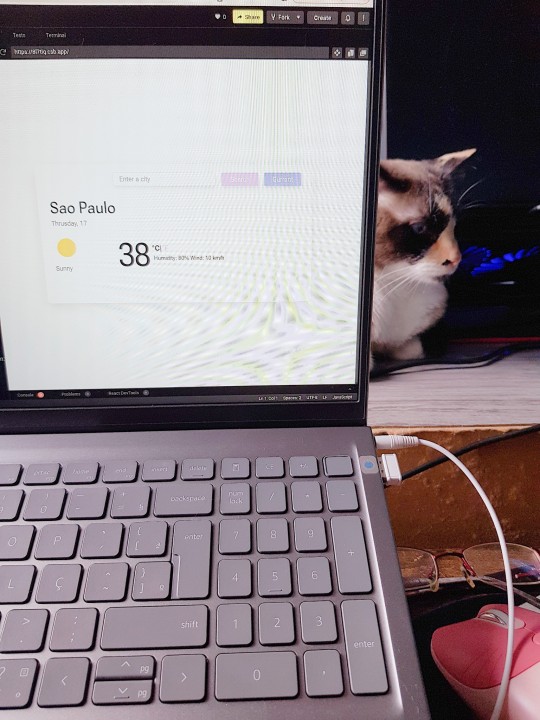

another day, another cat
today i finished the homework for week 1 of the react course and i had to "recode" the weather app into react components and it was pretty cool.
have a good weekend!
#codeblr#programming#web development#codenewbie#studyblr#coding#webdev#progblr#shecodes#reactjs#react#mine
48 notes
·
View notes
Text

Python, Java, or C++? Discover the key differences and strengths of these popular programming languages in this visual guide. Learn which language is best suited for beginners based on syntax, speed, and career goals.
#Programming#Python#Java#Cplusplus#Coding#LearnToCode#ProgrammingForBeginners#Tech#CodeNewbie#SoftwareDevelopment#TCCI Computer Coaching
3 notes
·
View notes
Text


The third HTML, CSS and BOOTSTRAP (intermediate) project CH#03 Contact-Us-page(06) 's snapshots. The source code is available on: github
#HTML#CSS#Bootstrap#WebDevelopment#Coding#WebDesign#FrontEndDevelopment#Programming#Developer#CodingLife#IntermediateProject#CodingJourney#LearnToCode#WebDevCommunity#CodeNewbie#100DaysOfCode#JavaScript#Tech#TechCommunity#WebDeveloper
7 notes
·
View notes
Text
Curious about when to use display: flex or display: inline-flex?
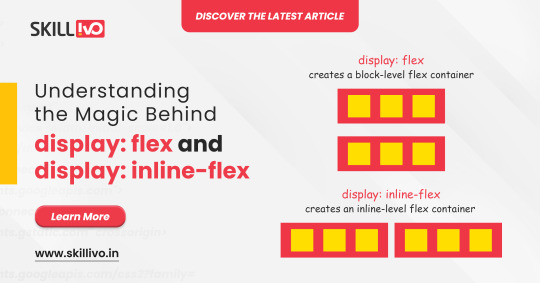
display: flex turns your element into a block-level flex container, giving you full control over its child elements' alignment and spacing. Perfect for structuring complex layouts! 🏗️
On the other hand, display: inline-flex gives you the same flex properties but maintains the container as an inline element. Ideal for inline-level layouts where you need the magic of flex without breaking the flow! 💫
Read Article- Click Here
Follow-
LinkedIn- Skillivo
#WebDevelopment#CSS#Flexbox#Coding#Frontend#WebDesign#Programming#CodeNewbie#LearnToCode#TechTips#Skillivo#ProgrammingTips#InlineFlex
3 notes
·
View notes
Text
Front-End Development: Building the Interface of the Future
Front-end development is at the heart of creating user-friendly and visually appealing websites. It involves translating designs into code and ensuring that web applications are responsive and interactive. In this article, we explore the key aspects of front-end development, essential skills, and emerging trends in the field.
What is Front-End Development?
Front-end development focuses on the user interface (UI) and user experience (UX) aspects of web development. It involves creating the part of the website that users see and interact with, using a combination of HTML, CSS, and JavaScript.
Core Technologies
HTML (HyperText Markup Language): HTML is the foundation of web pages, defining the structure and content, such as headings, paragraphs, and images.
CSS (Cascading Style Sheets): CSS is used to style and layout web pages, controlling aspects like colors, fonts, and spacing to create an attractive and consistent look.
JavaScript: JavaScript adds interactivity and dynamic content to web pages, enabling features like form validation, animations, and user input handling.
Popular Frameworks and Libraries
React: A JavaScript library for building fast and dynamic user interfaces, particularly single-page applications.
Angular: A comprehensive framework for building large-scale applications with a structured and modular approach.
Vue.js: A flexible framework that is easy to integrate into projects and focuses on the view layer of applications.
The Role of a Front-End Developer
Turning Designs into Code
Front-end developers take designs created by UI/UX designers and turn them into code. This involves creating HTML for structure, CSS for styling, and JavaScript for functionality, ensuring the design is faithfully implemented and functional across various devices and browsers.
Ensuring Responsiveness
With the growing use of mobile devices, it’s crucial that websites work well on screens of all sizes. Front-end developers ensure that web applications are responsive, meaning they adapt smoothly to different screen resolutions and orientations.
Optimizing Performance
Performance optimization is key in front-end development. Developers reduce file sizes, minimize load times, and implement lazy loading for images and videos to enhance the user experience.
Maintaining Cross-Browser Compatibility
A successful front-end developer ensures that web applications work consistently across different browsers. This involves testing and resolving compatibility issues to provide a uniform experience.
Implementing Accessibility
Making web content accessible to people with disabilities is a critical aspect of front-end development. Developers adhere to accessibility standards and best practices to ensure that everyone can use the website effectively.
Essential Skills for Front-End Developers
Mastery of Core Technologies
Proficiency in HTML, CSS, and JavaScript is fundamental. Front-end developers must be able to write clean, efficient code that is both maintainable and scalable.
Familiarity with Modern Frameworks
Knowledge of modern frameworks like React, Angular, and Vue.js is crucial for building contemporary web applications. These tools facilitate the creation of complex, dynamic interfaces.
Version Control with Git
Version control systems like Git are essential for tracking changes in the codebase and collaborating with other developers. Mastery of Git allows for efficient project management and collaboration.
Understanding of UX/UI Design
An understanding of UX/UI principles helps developers create user-friendly and aesthetically pleasing interfaces. This includes knowledge of user behavior, usability testing, and design basics.
Problem-Solving and Debugging
Front-end development often involves troubleshooting issues related to layout, functionality, and performance. Strong problem-solving skills are essential to identify and resolve these challenges efficiently.
Emerging Trends in Front-End Development
Progressive Web Apps (PWAs)
PWAs combine the best features of web and mobile applications, offering fast loading times, offline capabilities, and push notifications. They provide a native app-like experience within the browser.
WebAssembly
WebAssembly allows developers to run high-performance code in web browsers. It enables complex applications like games and video editors to run efficiently on the web, expanding the possibilities of front-end development.
Server-Side Rendering (SSR)
Server-side rendering improves the loading speed of web pages and enhances SEO. Frameworks like Next.js (for React) facilitate SSR, making it easier to build fast and search-friendly applications.
Single Page Applications (SPAs)
SPAs load a single HTML page and dynamically update the content as users interact with the application. This approach provides a smoother user experience, similar to that of a desktop application.
Component-Based Development
Modern frameworks emphasize component-based architecture, where UI elements are built as reusable components. This modular approach enhances maintainability and scalability.
AI and Machine Learning Integration
Integrating AI and machine learning into front-end development enables the creation of smarter, more personalized applications. Features like chatbots, recommendation engines, and voice recognition can significantly enhance user engagement.
#FrontEndDevelopment#WebDevelopment#UIUXDesign#HTML#CSS#JavaScript#ReactJS#Angular#VueJS#ResponsiveDesign#WebDesign#UserExperience#WebPerformance#WebAccessibility#SinglePageApplication#ProgressiveWebApp#WebDevelopmentTrends#ModernWebDev#FrontendFrameworks#CodeNewbie#LearnToCode#WebDevCommunity#CodingLife#TechTrends#WebComponents#WebAssembly#ServerSideRendering#DigitalDesign#UIComponents#WebOptimization
3 notes
·
View notes
Text
What is a Front-End Developer?
Front-End Development is the process of creating the visible part of a website or web app that users interact with directly in their browser. It involves building layout, design, and interactivity using the following core technologies:
HTML (HyperText Markup Language): Defines the structure of web pages.
CSS (Cascading Style Sheets): Styles and formats the content (colors, layout, fonts).
JavaScript: Adds dynamic behavior and interactivity (e.g., sliders, forms, menus).
Front-end developers focus on user experience (UX), responsive design (mobile-friendly), and ensuring websites work across different browsers and devices.
HTML – Structure of webpages
CSS – Styling and layouts
JavaScript – Interactivity and logic
Responsive Design – Mobile-first layouts
Version Control (Git & GitHub) – Code tracking
Basic SEO Principles – How front-end affects search visibility
Optional: CSS Frameworks – Like Bootstrap or Tailwind
Optional: JavaScript Libraries – Like React (for later stages)

#FrontEndDevelopment#WebDevelopment#FrontendDeveloper#LearnToCode#WebDesign#CodeNewbie#DevCommunity#HTML#CSS#JavaScript
0 notes
Text
Will OpenAI Codex, The AI Coding Agent, Replace Software Engineers?
Introduction: The Rise of AI in Software Development
Artificial Intelligence (AI) is currently the most disruptive technology in tech, and OpenAI Codex, the powerful AI coding agent, is at the forefront. Built on the same tech powering ChatGPT, Codex can write code, build applications, and automate mundane programming tasks. But the question on every programmer's mind is: Can OpenAI Codex substitute for software engineers?
Let's dive deep into this groundbreaking tech and explore its impact on software engineering careers.
What Is OpenAI Codex?
OpenAI Codex is a powerful AI model that has been trained on billions of lines of public code in repositories like GitHub. It is able to read natural language and translate it into working code in various programming languages, such as Python, JavaScript, Java, and more. From developing simple scripts to generating full-fledged apps, Codex acts like an amplified coding assistant.
Major Features:
Autocompletes code according to context
Translates plain English into working code
Generates boilerplate and redundant code skeletons
Builds websites, games, and even APIs from scratch
Will Codex Replace Software Engineers?
Short answer: No way. But it will radically change the way developers develop.
1. Automation of Repetitive Work Codex excels at automating boring tasks like generating test cases, boilerplate code, and API wrapping. This frees engineers to focus on higher-level logic and design decisions.
2. Prototyping and MVP Creation Much Faster Startups and small teams can use Codex to speed up prototyping. It allows solo founders or junior engineers to make things happen without needing a big engineering organization.
3. Skill Enhancement, Not Replacement For experienced developers, Codex is an accelerator, not a replacement. It's a syntax assistant that suggests better code patterns, even for debugging—it's like having a live pair programmer.
Limitations of Codex: Why Human Engineers Still Matter
Despite its prowess, Codex has major flaws:
Does Not Understand Deep Context: It cannot fully grasp business logic or domain complexity.
Error-Prone for Hard Cases: Codex can produce buggy or vulnerable code without human oversight.
No Architectural Choices: AI is still not capable of writing scalable systems or trade-offs in architectural design.
Software development isn't all about writing code—it's about solving problems, collaborating with others, and releasing maintainable, secure code. AI can't replace those qualities of human-ness, at least not today.
The Future: Human-AI Partnership in Software Engineering
Rather than replacing jobs, OpenAI Codex will redefine them. What software engineers do will shift from being code writers to AI-powered problem solvers. Developers will need to adapt, learning how to operate in concert with AI tools.
Just like calculators did not render mathematicians redundant, Codex will not render software engineers redundant. It will, however, become the essential tool for every developer.
Conclusion: Adapt, Don't Fear OpenAI Codex is a gigantic leap forward in development by AI, but it's not a killer project—because it's a game-changer. Codex offers excellent opportunities to get smarter and faster for those willing to evolve with the technology. The future isn't about AI vs engineers—but AI and engineers working together to build the future.
#OpenAICodex#AIinSoftwareDevelopment#ArtificialIntelligence#AItools#MachineLearning#CodingWithAI#AIProgramming#CodexAI#GitHubCopilot#AIEngineer#SoftwareEngineering#SoftwareDeveloper#WebDevelopment#FullStackDevelopment#DevTools#CodeNewbie#ProgrammerLife#DeveloperCommunity#100DaysOfCode#CodingLife
0 notes
Text
Tourism management system In Java
Looking for a Java project to boost your portfolio? The Tourism Management System Project in Java is a great choice for students and beginners. It includes user and admin login, tour package management, and booking features — all built using Java Swing and file handling. 👉 Download the source code here
#finalyearproject#programming#studentproject#codenewbie#projectsforeveryone#engineeringproject#miniproject#studentprojects
0 notes
Text
HTML and CSS Made Simple: Know the Difference and Why It Matters

If you're beginning your journey in web development, you've likely encountered the two most fundamental technologies: HTML and CSS. They are the building blocks of nearly every website you’ve ever visited. While these two tools work side by side, they each play distinct roles in how websites look and function. Understanding the HTML and CSS differences is crucial for anyone wanting to build a clean, functional, and visually appealing website.
In this blog, we’ll explain what HTML and CSS are, how they differ, and why knowing both is essential in 2025 and beyond.
What Is HTML?
HTML stands for HyperText Markup Language. It's the standard language used to create the structure and content of a webpage. Think of HTML as the skeleton of a website. It organizes everything — from text, headings, and images to links and videos — into a readable format for web browsers.
Here’s a simple HTML example:
<h1>Welcome to My Website</h1> <p>This is a paragraph about me.</p> <img src="profile.jpg" alt="My Profile Picture">
With just a few lines of HTML, you can add essential elements to a page. But while HTML is powerful for content structure, it doesn’t handle design.
What Is CSS?
CSS, or Cascading Style Sheets, is the language used to style and design the elements you create with HTML. CSS controls how your web page looks — colors, fonts, spacing, layout, and more. If HTML is the skeleton, CSS is the skin, clothing, and personality that make your website visually appealing.
Here’s how CSS can change the look of the HTML example above:
h1 { color: blue; font-size: 36px; } p { font-family: Arial, sans-serif; color: #444; }
By linking this CSS code to your HTML file, you can completely transform how your page appears, all without altering the content.
Why Does the Difference Matter?
Understanding the difference between HTML and CSS helps you:
Design better websites – You can separate structure and style, making your site easier to build and maintain.
Write clean code – You’ll avoid clutter by keeping your content (HTML) and design (CSS) in separate files.
Make your site responsive – CSS allows for flexible design that works on all screen sizes.
Collaborate efficiently – Designers and developers often work together. Knowing both HTML and CSS makes communication smoother.
Level up your career – Most front-end development jobs require a solid grasp of both technologies.
How Do HTML and CSS Work Together?
To build a modern website, you need both HTML and CSS. Here’s how you connect them:
Write your HTML content
Create a CSS file with all your styles
Link the CSS file to your HTML file using a simple line of code in the <head> section:
<link rel="stylesheet" href="styles.css">
Now, every element in your HTML file can be styled using your CSS rules. This separation makes updating your site fast and efficient.
Real-World Analogy
Still confused? Think of building a house.
HTML is like laying the bricks, putting up the walls, and installing the windows.
CSS is choosing the paint colors, installing curtains, and decorating the interior.
One provides the structure, and the other provides the look and feel.
Why Learn HTML and CSS in 2025?
In 2025, the demand for front-end developers continues to grow. As more businesses go digital, the need for well-designed, functional websites is increasing. Learning HTML and CSS opens doors to roles such as:
Web Developer
UI/UX Designer
Front-End Engineer
WordPress Developer
Freelance Web Designer
Even if you don’t plan to code professionally, knowing the basics helps you better manage websites, communicate with developers, or even build your personal portfolio.
Where to Start Learning
The best way to learn HTML and CSS is by doing. Here are a few steps to get you started:
Use free platforms like W3Schools, free Code Camp, or MDN Web Docs
Watch YouTube tutorials for beginners
Practice by building small web pages (a resume, a portfolio, or a personal blog)
Join online communities and forums for support and feedback
Consistency is key. Start small and gradually build more complex layouts and styles.
Final Thoughts
HTML and CSS are the foundation of web development. While they serve different functions, they are designed to work together seamlessly. Understanding the difference between HTML and CSS not only helps you become a better coder but also makes your web projects more efficient, attractive, and professional.
So whether you're a student, a business owner, or an aspiring developer, start learning HTML and CSS today. You’ll be amazed at how quickly you can bring your ideas to life on the web.
#HTML#CSS#HTMLvsCSS#WebDevelopment#FrontEndDevelopment#LearnToCode#CodingForBeginners#WebDesign#ProgrammingBasics#WebDevelopmentTips#WebsiteDesign#HTMLandCSS#TechEducation#CodeNewbie#DigitalSkills
0 notes
Text

Day 22 — 29/ 100 Days of Code
✧˖° ♡ progress update
Kept learning more about functions and things are getting slightly more complex, i'm allowing myself to progress at slow pace and take the time to grasp everything by doing enough practice before jumping to the next lesson.
I also made a page in notion for my Javascript notes, idk why i thought using text doc to take notes was a good idea, notion is being a game changer honestly!

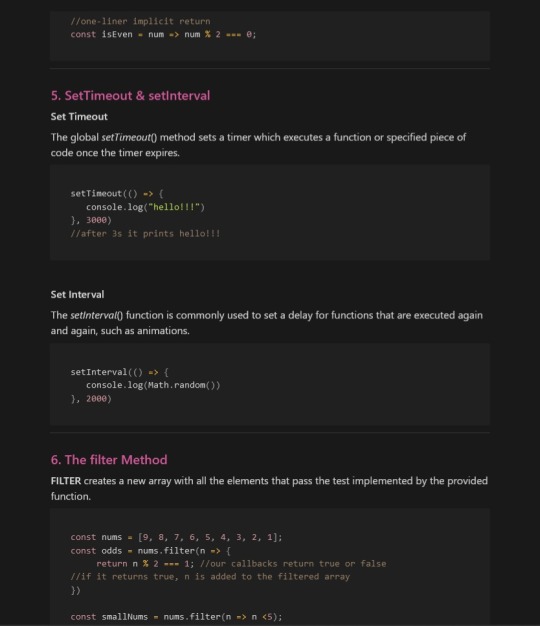
#learning#coding#webdevelopment#codeblr#studyblr#growing#imporving#self improvement#cs#computer science#programming#codenewbie#tech#learn to code#frontend#100daysofcode#coding blog#htlm#css#JavaScript#problem solving
137 notes
·
View notes
Text

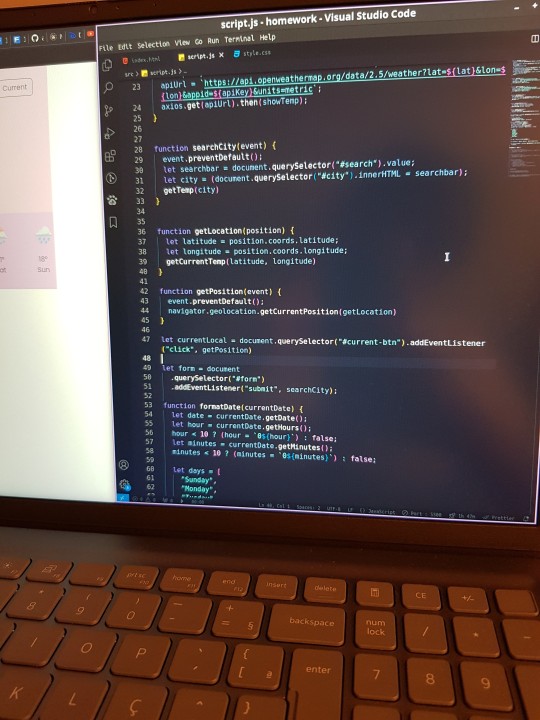
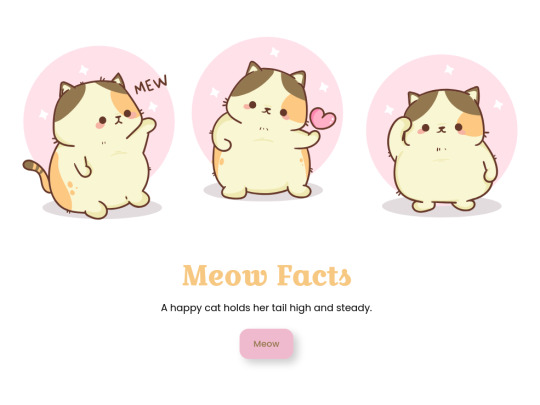

03/10/23
i finished shecodes week 5 homework, and now the app we're building has real-time temperature, as well as description of temperature, humidity and wind! you can search the city or you can get temperature of your current location!! this is really cool!
learning about api has being really exciting, so i made a simple page using meow-facts api where you click meow to get facts about cats, you can check the repository and the live page!
really excited to learn more about api!
ps: this sakura chocolate is the cutest thing! i almost didn't eat it 🥺
49 notes
·
View notes
Text
Full stack web development

At CodingBit IT Solutions, we empower learners and professionals to become top-tier full stack developers. Our Full Stack Development Program is crafted to provide in-depth training across both front-end and back-end technologies, preparing you to build complete, scalable, and high-performance web applications.
We don’t just teach you to code — we prepare you for the real-world challenges of the tech industry. With a curriculum aligned to current industry demands, our program covers everything from basic programming concepts to advanced frameworks and cloud deployment.
Full stack web developmen: ✅ Expert trainers with industry experience ✅ Practical, hands-on projects ✅ Code reviews and one-on-one mentorship ✅ Job-ready portfolio development ✅ Career services: resume prep, mock interviews, and job placement support
Whether you’re a student, a professional looking to upskill, or someone aiming for a career shift, Full stack web developmen gives you the tools, confidence, and support to thrive as a full stack developer.
The CodingBit Full Stack Development Course takes you on a complete journey through web development — from foundational coding to advanced server-side programming. You will learn how to:
Build beautiful, responsive websites
Develop robust back-end servers and APIs
Work with databases to store and manage data
Deploy applications to the cloud
Collaborate on projects using modern tools and workflows
#WebDevelopment#CodingLife#LearnToCode#DeveloperJourney#TechCareers#ProgrammingLife#CodeNewbie#WomenWhoCode#FullStackDeveloper
1 note
·
View note
Text





The fourth HTML, SCSS, BOOTSTRAP, JavaScript project CH#04 Home-page(desktop)(01)s' snapshots. The source code is available on: github
#HTML#CSS#Bootstrap#WebDevelopment#Coding#WebDesign#FrontEndDevelopment#Programming#Developer#CodingLife#IntermediateProject#CodingJourney#LearnToCode#WebDevCommunity#CodeNewbie#100DaysOfCode#JavaScript#Tech#TechCommunity#WebDeveloper
4 notes
·
View notes
Text
#FullStackDeveloper#WebDeveloper#FullStackDev#FrontendDevelopment#BackendDevelopment#CodingLife#DeveloperLife#JavaScriptDeveloper#ReactJS#NodeJS#PythonDeveloper#WebDevCommunity#TechLife#SoftwareEngineer#ProgrammerLife#CodeNewbie#DevJourney#100DaysOfCode#WomenWhoCode#DailyCoding#TechCareers#DebuggingLife#WebDevelopment#LearnToCode#FullStackEngineering
0 notes
Text

Python Trending Topics
Want to stay ahead in tech? These Python skills are in high demand:
✅ Automation & scripting
✅ Web scraping & chatbots
✅ AI & Machine Learning
✅ FastAPI & async web apps
Whether you're a beginner or looking to upskill, these are the areas to focus on. Learn them all in our Python Full Stack Development course!
📲 DM us or click the link in bio to join our Python Full Stack Developer Course.
🎯 Start Your Journey Today!
📞 +91 9704944488 🌐 www.pythonfullstackmasters.in 📍 Location: Hyderabad, Telangana
#PythonTrends#PythonLearning#FullStackPython#PythonMasters#AIwithPython#PythonAutomation#MachineLearningWithPython#FastAPI#PythonForBeginners#CodeNewbie#WebDevelopmentIndia#LearnToCode
0 notes